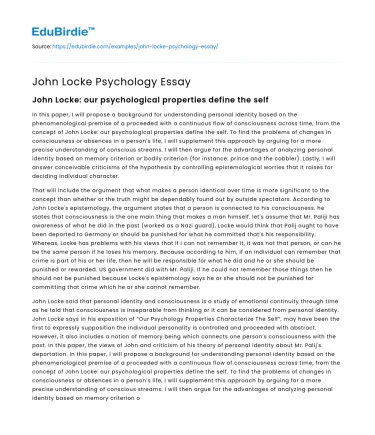John Locke: our psychological properties define the self
In this paper, I will propose a background for understanding personal identity based on the phenomenological premise of a proceeded with a continuous flow of consciousness across time, from the concept of John Locke: our psychological properties define the self. To find the problems of changes in consciousness or absences in a person’s life, I will supplement this approach by arguing for a more precise understanding of conscious streams. I will then argue for the advantages of analyzing personal identity based on memory criterion or bodily criterion (for instance: prince and the cobbler). Lastly, I will answer conceivable criticisms of the hypothesis by controlling epistemological worries that it raises for deciding individual character.
That will include the argument that what makes a person identical over time is more significant to the concept than whether or the truth might be dependably found out by outside spectators. According to John Locke's epistemology, the argument states that a person is connected to his consciousness. he states that consciousness is the one main thing that makes a man himself. let's assume that Mr. Paliji has awareness of what he did in the past (worked as a Nazi guard), Locke would think that Palij ought to have been deported to Germany or should be punished for what he committed that’s his responsibility. Whereas, Locke has problems with his views that if I can not remember it, it was not that person, or can he be the same person if he loses his memory. Because according to him, if an individual can remember that crime is part of his or her life, then he will be responsible for what he did and he or she should be punished or rewarded. US government did with Mr. Paliji. If he could not remember those things then he should not be punished because Locke's epistemology says he or she should not be punished for committing that crime which he or she cannot remember.
Save your time!
We can take care of your essay
- Proper editing and formatting
- Free revision, title page, and bibliography
- Flexible prices and money-back guarantee
John Locke said that personal identity and consciousness is a study of emotional continuity through time as he told that consciousness is inseparable from thinking or it can be considered from personal identity. John Locke says in his exposition of “Our Psychology Properties Characterize The Self”, may have been the first to expressly supposition the individual personality is controlled and proceeded with abstract. However, it also includes a notion of memory being which connects one person’s consciousness with the past. In this paper, the views of John and criticism of his theory of personal identity about Mr. Palij's deportation. In this paper, I will propose a background for understanding personal identity based on the phenomenological premise of a proceeded with a continuous flow of consciousness across time, from the concept of John Locke: our psychological properties define the self. To find the problems of changes in consciousness or absences in a person’s life, I will supplement this approach by arguing for a more precise understanding of conscious streams. I will then argue for the advantages of analyzing personal identity based on memory criterion or bodily criterion (for instance: prince and the cobbler). Lastly, I will answer conceivable criticisms of the hypothesis by controlling epistemological worries that it raises for deciding individual character.
That will include the argument that what makes a person identical over time is more significant to the concept than whether or the truth might be dependably found out by outside spectators. According to John Locke's epistemology, the argument states that a person is connected to his consciousness. he states that consciousness is the one main thing that makes a man himself. let's assume that Mr. Paliji has awareness of what he did in the past (worked as a Nazi guard), Locke would think that Palij ought to have been deported to Germany or should be punished for what he committed that’s his responsibility. Whereas, Locke has problems with his views that if I can not remember it, it was not that person, or can he be the same person if he loses his memory. Because according to him, if an individual can remember that crime is part of his or her life, then he will be responsible for what he did and he or she should be punished or rewarded. US government did with Mr. Paliji. If he could not remember those things then he should not be punished because Locke's epistemology says he or she should not be punished for committing that crime which he or she cannot remember.
Did you like this example?
Make sure you submit a unique essay
Our writers will provide you with an essay sample written from scratch: any topic, any deadline, any instructions.
Cite this paper
-
APA
-
MLA
-
Harvard
-
Vancouver
John Locke Psychology Essay.
(2023, October 27). Edubirdie. Retrieved December 22, 2024, from https://edubirdie.com/examples/john-locke-psychology-essay/
“John Locke Psychology Essay.” Edubirdie, 27 Oct. 2023, edubirdie.com/examples/john-locke-psychology-essay/
John Locke Psychology Essay. [online].
Available at: <https://edubirdie.com/examples/john-locke-psychology-essay/> [Accessed 22 Dec. 2024].
John Locke Psychology Essay [Internet]. Edubirdie.
2023 Oct 27 [cited 2024 Dec 22].
Available from: https://edubirdie.com/examples/john-locke-psychology-essay/
copy






 Stuck on your essay?
Stuck on your essay?

